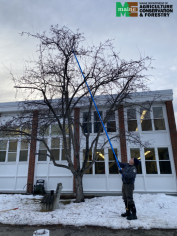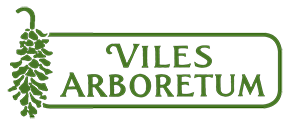From the Maine Department of Agriculture Conservation & Forestry, Maine Forest Service: Young browntail caterpillars create their winter webs in the summer and early fall by combining leaves together with white silk. During the winter, browntail caterpillars are dormant and rest inside their webs where they are protected from the harsh weather. These webs are usually at the tips of branches of their favorite host trees: oak, fruit trees (including ornamental varieties), black cherry, elm, birch, shadbush, roses, and others.
Winter is the best time to check your property for winter webs created by browntail. If you do have winter webs in your trees, follow the 4 Rs to Knockout Browntail:
- Recognize winter webs. On a sunny winter day, stand with your back to the sun and look at your trees. Because their winter webs are made with silk, the webs will reflect the sunlight and be easier to spot. Consider focusing on trees in high traffic areas (i.e. closest to your house or areas of recreation).
- Remove winter webs before April. Each winter web can contain 25-400 caterpillars; removing winter webs in high traffic areas (like your dooryard) can help reduce the browntail caterpillars that will emerge next year. Webs can be removed using pruning shears or an extendable pole pruner. Removal is recommended during the winter, when the webs are easiest to see, but before they emerge from their webs in April.
Destroy webs after removal by soaking them in a bucket of soapy water for a few days, or burning them in a safely contained fire to kill caterpillars inside the webs. Clipped webs that remain on the ground outside still contain live caterpillars that will emerge in the spring and climb back up the host tree. - Recruit professionals when you can't remove winter webs. Some webs found in tall trees may only be removed by a licensed professional. Check out our list of licensed arborists or our list of FAA-certified commercial remote pilots who offer browntail web removal in tall trees using unmanned aerial vehicles.
- Reach out and educate others on the benefits of removal. The more browntail webs that are removed, the more likely it is that impacts may be reduced. Consider hosting a clipping party to remove winter webs in your neighborhood!

Maine Forest Service District Forester Kenny Fergusson uses an extendable pole pruner to remove winter webs at a clipping event in Orono, Maine. Photo: Megan Hess, Orono Public Works.
Pesticides may be considered for trees around your house or backyard when winter web removal is not possible. Pesticide treatments are most effective at reducing harmful impacts from browntail when they are applied by a licensed professional in the spring and the treatments will take effect before the end of May.
Winter is a great time to reach out to pesticide applicators to assess trees on your property and set up an appointment for pesticide treatment in spring. We have compiled a list of local licensed pesticide applicators for hire that are willing to treat browntail moth. Please note that these companies responded to a Maine Forest Service survey and agreed to be listed in this resource; the Maine Forest Service does not recommend these companies above any others.

